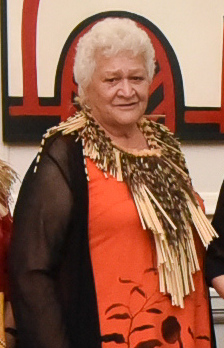Related Research Articles

Oromo, historically also called Galla, which is regarded by the Oromo as pejorative, is an Afroasiatic language that belongs to the Cushitic branch. It is native to the Ethiopian state of Oromia and northern Kenya and is spoken predominantly by the Oromo people and neighboring ethnic groups in the Horn of Africa. It is used as a lingua franca particularly in the Oromia Region and northeastern Kenya.
Jolene Douglas is a contemporary New Zealand Māori artist who has been exhibiting since 1983. Two of her art works are in the collection of Museum of New Zealand Te Papa Tongarewa. She is currently living in Gisborne and been a curator Tairawhiti Museum since 1995. Douglas was born in 1950 in Matamata, New Zealand.
Ngāti Rangitihi is a Māori iwi of New Zealand, based in the Bay of Plenty.
Tsavo West National Park is located in Taita-Taveta County of Kenya. The park covers an area of 9,065 square kilometres. The A109 road Nairobi-Mombasa and a railway divides it from the adjoining Tsavo East National Park. Together with adjoining ranches and protected areas, they comprise the Tsavo Conservation Area. Tsavo West is a more popular destination due to its magnificent scenery and the Mzima Springs, the rich and varied wildlife, a good road system, a rhino reserve, rock climbing potential and guided walks along the Tsavo River. The park is operated by Kenya Wildlife Service.
Mijikenda is a Bantu dialect cluster spoken along the coast of East Africa, mostly in Kenya, where there are 2.6 million speakers but also in Tanzania, where there are 166,000 speakers. The name Mijikenda means "the nine settlements" or "the nine communities" and refers to the multiple language communities that make up the group. An older, derogatory term for the group is Nyika which refers to the "dry and bushy country" along the coast.

Waata Pihikete Kukutai was a New Zealand Māori tribal leader, farmer and assessor. He identified with the Ngāti Tipa and Waikato iwi.
The Oromoid languages are a branch of Lowland East Cushitic languages that includes the most populous Cushitic language, Oromo, and the closely related Konsoid dialect cluster.
Idakho, Isukha, and Tiriki are mutually intelligible Kenyan languages within the Luhya ethnic group. They are a set of languages closely related to some other Luhya ethnic groups like Maragoli, but less so in comparison to others, like Bukusu,Tachoni or Samia.
The Waata, or Sanye, are an Oromo-speaking people of Kenya and former hunter-gatherers. They share the name Sanye with the neighboring Dahalo.
Sanye may be any of several Cushitic languages spoken by former hunter-gatherers in Kenya:

Colleen Elizabeth Waata-Urlich was a New Zealand ceramicist. Of Māori descent, she belonged to Te Popoto o Ngāpuhi ki Kaipara and Te Rarawa. Through education, involvement in Māori art collectives and production of exhibited work, Urlich was dedicated to the development of Māori art.
Ngā Kaihanga Uku is a New Zealand collective of Māori Clayworkers. They formed in 1986 during a Ngā Puna Waihanga gathering, under the leadership of Baye Riddell and Manos Nathan. Founding members also include Paerau Corneal, Colleen Waata Urlich and Wi Taepa.
Ngaahina Hohaia is a visual artist and weaver of Te Āti Awa, Ngāti Ruanui, Ngāti Moeahu, Ngāti Haupoto and Greek descent from Parihaka, New Zealand.
Priyanka Barve is an Indian playback singer and actress. Barve has sung songs in Marathi, Hindi and in some other Indian languages, however she is most active in the Marathi industry. Barve is known for playing Anarkali in Feroz Khan's Broadway adaptation of Mughal E Azam. She Won Maharashtra State Film Award for Best Female Playback Singer at 56th Maharashtra State Film Awards for Song "Kalokhachya watevarti" From Film Bandishala.
Waata Roore Erueti (1868–1952), known simply as Roore Erueti and occasionally with the surname Edwards was a Tainui historian and a noted repository of whakapapa. He served as an advisor to King Korokī Mahuta and as the spokesperson for Kingitanga leader, Te Puea Herangi. In 1946, Roore accepted the compensation settlement for the 1864 Confiscation of Waikato Land by the Crown speaking on Te Puea's behalf. In 1947, Roore was appointed as an Officer of the Order of the British Empire (OBE) for his service to the Māori people.
The Degere are a Mijikenda-speaking group of former hunter-gatherers of Kenya and Tanzania, now settled along the Ramisi, Mwena and Umba rivers, with a few along the coast. They may number no more than a few hundred to at most a few thousand. They are believed to be related to, possibly descended from, the Oromo-speaking Waata. They are variously reported to speak Duruma, Digo, a similar Mijikenda dialect of their own, or to speak Mijikenda with grammatical errors much as the Waata do when they speak Mijikenda.

Sonia Armana Snowden is a New Zealand Māori tohunga raranga who tutored in arts and weaving at Te Wananga o Raukawa. She identifies with the Ngāpuhi iwi. Her works are held in the collection of Museum of New Zealand Te Papa Tongarewa.

Cushitic-speaking peoples are the ethnolinguistic groups who speak Cushitic languages natively. Today, the Cushitic languages are spoken as a mother tongue primarily in the Horn of Africa, with minorities speaking Cushitic languages to the north and south in Egypt, Sudan, Kenya, and Tanzania.
Urlich is a surname. Notable people with the surname include:
Waata is a surname. Notable people with the surname include:
References
- ↑ Waata at Ethnologue (26th ed., 2023)
